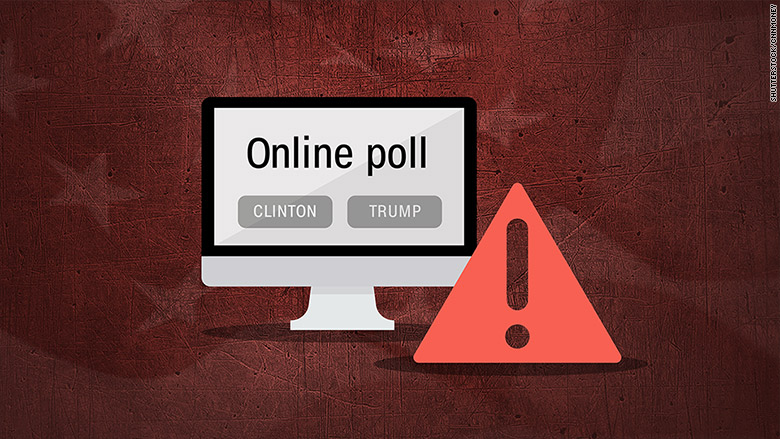
Donald Trump continues to mislead people about political polling, forcing several news outlets to reconsider whether they should post "who won?" online surveys after presidential debates.
But at least one outlet, Fortune magazine, says it has no qualms about conducting the unscientific surveys. "No one should confuse this with a scientific poll," Fortune editor in chief Alan Murray told CNNMoney.
Trump, however, has been confusing the two.
"Every single online poll said that we won, which is great. Every single online poll," Trump said at a Thursday afternoon rally.
Ever since Monday's debate, Trump has been citing "polls" that are really more like virtual contests, since they allow anyone to vote multiple times.
Thursday on MSNBC, anchor Chuck Todd was visibly frustrated by the Trump campaign's promotion of the "polls." He called them "bogus."
"They're not real, Jason," Todd said to Trump aide Jason Miller.
But other news outlets believe the surveys are worth doing.
"We think it's a useful way to engage our readers and have them interact with our material," Sam Jacobs, an assistant managing editor of Time magazine, said in a phone interview.
Trump has repeatedly cited Time's survey and others as proof that he won the debate, countering the media consensus (and the private views of some Trump aides) that Hillary Clinton prevailed.
"We clearly identify the nature of the poll," Jacobs said. "We say that it's not representative of overall voter reaction, nor is it predictive of the election results."
The reality, Jacobs said, is that "we can't control what candidates do."
News outlets could choose not to conduct unscientific web surveys. Some professional pollsters would appreciate that — because these unscientific contests confuse people about how real polling works.
For the news organizations, this is a matter of brand credibility.
Actual political polls are carefully crafted by researchers to measure nationwide or state-wide opinion. The pollsters question a sample of Americans — often about 1,000 of them — while accounting for age, gender, race, and other factors. The goal is a scientifically credible snapshot of public opinion.
Online surveys, on the other hand, are a free-for-fall.
Trump either doesn't know the distinction or is ignoring it. On Wednesday night he complained that he "won" many web surveys, but keeps hearing about "how those polls don't mean anything."
"But when they poll 300 people, that means a lot, right?" he asked, playing to his crowd.
The answer is yes — even a scientific poll of 300 people, conducted correctly, can be a better gauge of actual public opinion than an online survey of 100,000 people.
Some influential conservative media figures are following Trump's lead and conflating the two kinds of polls. On his radio show on Thursday, Rush Limbaugh said Trump "kicked rear end" in the Time, Drudge Report and other polls, while "in the CNN flash poll afterwards it was Hillary that won big, 62-27."
In fact, CNN/ORC's post-debate poll was conducted by researchers, while the Time and Drudge polls were actually just unscientific web surveys.
Speaking with Todd on MSNBC, Miller dismissed the CNN/ORC poll by saying "CNN gets a lot of things wrong."
The CNN/ORC poll of debate watchers sampled a higher number of Democrats than Republicans, but "even independents who watched deemed Clinton the winner," CNN polling director Jennifer Agiesta wrote Monday night.
Miller said on MSNBC that the Trump campaign believes the web polls are a "much more accurate reflection of what happened on Monday night."
Political reporters and polling experts voiced their dismay on Twitter.
As for Time magazine, Jacobs said that Time is partnering with SurveyMonkey, a scientific online polling outfit, for a real poll that will be released ahead of the next debate.
He said it is unclear whether Time will post another informal survey on Time.com after the next debate.
Murray, who is both the editor of Fortune and the chief content officer for all of Time Inc., said "of course" Fortune will keep posting the surveys.
"We love getting feedback from our readers, and this is one good way to do it," he said in response to emailed questions.
Murray acknowledged that there is no restriction on casting multiple votes. Some critics of the surveys have asserted that Trump supporters, organized on forums like Reddit, sought to manipulate Monday's surveys.
"Stuffing the ballot box is always a possibility," Murray said. "Again, these are not intended to be scientific polls."
The surveys on Time, Fortune and CNBC's web sites all used the same third party plug-in from a company called Playbuzz.
Jacobs said there are indications from Playbuzz that there was some ballot box stuffing on both sides, Trump's and Clinton's, but that it didn't sway the outcome.
A spokeswoman for CNBC defended its survey by saying "the bold, clearly marked and prominently positioned disclaimer states the following: This is an informal poll. Results are not scientific and may not necessarily reflect the opinions of the public as a whole."
The network did not comment on whether it would continue posting surveys after debates.


